TAXANGLES A newsletter for proactive planning... In this edition... Register for Child Benefit even if the HICBC applies Electric charging points – Is there a tax liability? New reduced rate of VAT for hospitality and leisure Increasing the normal minimum pension age Reporting Covid-19 Support Payments on your tax return Wedding celebrations for Laura and Adam Tax Diary - November 2021 November 2021 Issue www.compassaccountants.co.uk

PAGE 2 If you are responsible for bringing up a child who is under the age of 16, or under the age of 20 where they remain in approved education or training (such as A levels but not education at an advanced level, such as university), you can claim child benefit. Only one person can receive child benefit in respect of a particular child. For 2021/22, child benefit is payable at the rate of £21.15 for the eldest or only child, and at the rate of £14 per week for any additional children. It is paid every four weeks. HICBC The High Income Child Benefit Charge (HICBC) applies to claw back child benefit paid where the recipient, or their partner if they have one, has ‘adjusted net income’ of £50,000 or more. This is income before personal allowances and deductions for items such as Gift Aid. The HICBC works by clawing back 1% of the child benefit paid for every £100 by which adjusted net income exceeds £50,000. Where adjusted net income exceeds £60,000, the HICBC is equal to 100% of the child benefit paid in the tax year. Who pays the tax? Where both the claimant and the claimant’s partner have adjusted net income in excess of £50,000, the HICBC is payable by the person who has the highest adjusted net income. If only one of them has adjusted net income in excess of £50,000, then that person is responsible for paying the tax. This means that the person on whom liability for the HICBC falls is not necessarily the same person who has received the child benefit. For the purposes of the charge, a person is a partner of the claimant if they are married to the claimant or in a civil partnership with the claimant and not permanently separated, or someone who lives with the claimant as if they were married or in a civil partnership. The charge will apply regardless of whether the claimant’s partner is biologically related to the child in respect of whom the child benefit is paid, or is responsible for that child. Elect not to receive child benefit To eliminate the need to repay child benefit received in the form of the HICBC, where the charge is equal to 100% of the child benefit, it may be easier to elect for this not to be paid. Where child benefit is already being paid, the claimant can opt out of payments by completing the online form or contacting HMRC by post or by phone. Register to benefit from National Insurance credits Where HICBC applies but the claimant would not otherwise pay sufficient National Insurance contributions for the year to be a qualifying year for state benefit purposes (for example, where the claimant does not work or has low earnings and the HICBC is payable by the claimant’s partner), it is important for the claimant to register for child benefit in order to receive National Insurance credits to preserve their state pension entitlement. These are available where a person is registered for child benefit in respect of a child under 12. At the time of registering, the claimant can elect for the child benefit not to be paid, where this is preferable to receiving it and paying the same amount in the form of the HICBC.
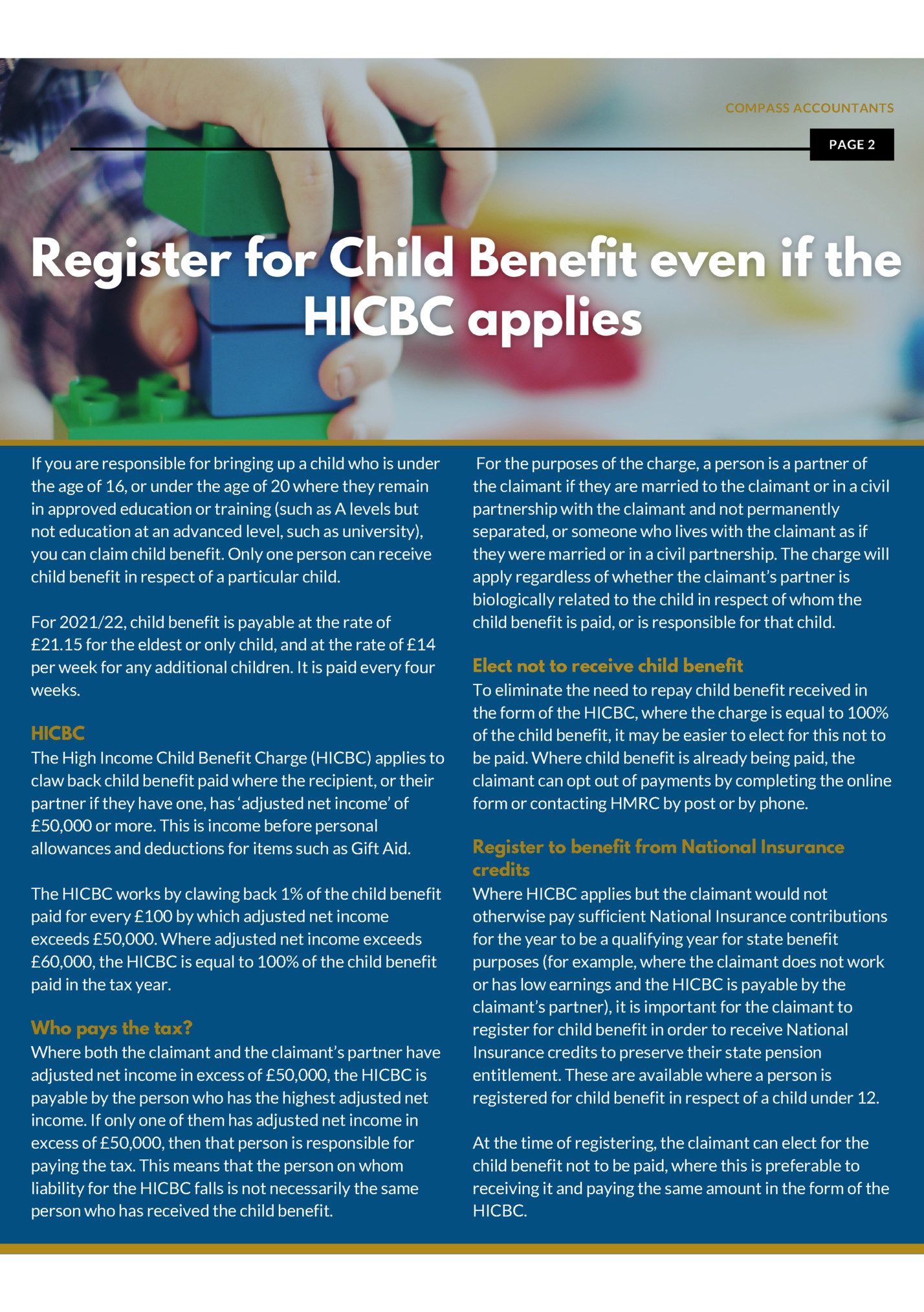
PAGE 3 Electric charging points – Is there a tax liability? As part of the Government’s push to encourage drivers to ‘go electric’, the Transport Secretary, Grant Shapps, announced an extension to a £50 million Government fund to install electric charge points. The fund aims to help small business to gain access to the workplace charging scheme and provide grants to meet up to 75% of the cost of installing electric charging points at domestic premises. While tax advantages are available where employees opt for an electric company car, does a tax charge arise if an employer provides a charging point to enable employees to charge their own cars at work? Workplace electric vehicle charging A tax exemption applies to remove the charge that might potentially arise where an individual charges the battery of a vehicle that is used by the employee. Private vehicles The exemption means that an employee is able to charge their own car, or one that they are driving or a passenger in, using a workplace charging free of any associated benefit in kind tax charge. There is no requirement that the electricity provided is used for business journeys; the exemption applies regardless of whether the charge powers business or private journeys. The exemption covers: the cost of the electricity; the cost to the employer of providing the charging facilities; and any connected services. However, the exemption only applies if the following conditions are met: the charging facility is provided at or near the employee’s place of work; charging must be available to all the employees generally or those at the particular workplace should they wish to use the facilities; and the vehicle which is charged is one in which the employee is the driver or a passenger. Company vehicles Likewise, no tax charge arises if an employee uses a workplace charger to charge an electric company car. There would, in any event, be no tax charge in respect of electricity provided for business journeys. However, as electricity is not treated as a ‘fuel’ for company car purposes, the use of a workplace charging facility does not trigger the fuel benefit charge if the charge provided powers private journeys. Offsite charging The tax exemption does not apply to the reimbursement or payment of an employee’s personal expenditure in respect of charging a battery in a private vehicle away from the employer’s premises, for example, at a motorway service station. Where the vehicle is used for business journeys, mileage allowances may be paid taxfree up to the approved amount. However, no tax charge arises in respect of the provision of electricity for a company car for private mileage as electricity is not treated as a fuel for the purposes of the fuel benefit charge. Capital allowances A first-year capital allowance of 100% of the expenditure is available for expenditure on electric charge-point equipment. The allowance is available for expenditure incurred before 1 April 2023 for corporation tax purposes and before 6 April 2023 for income tax purposes.
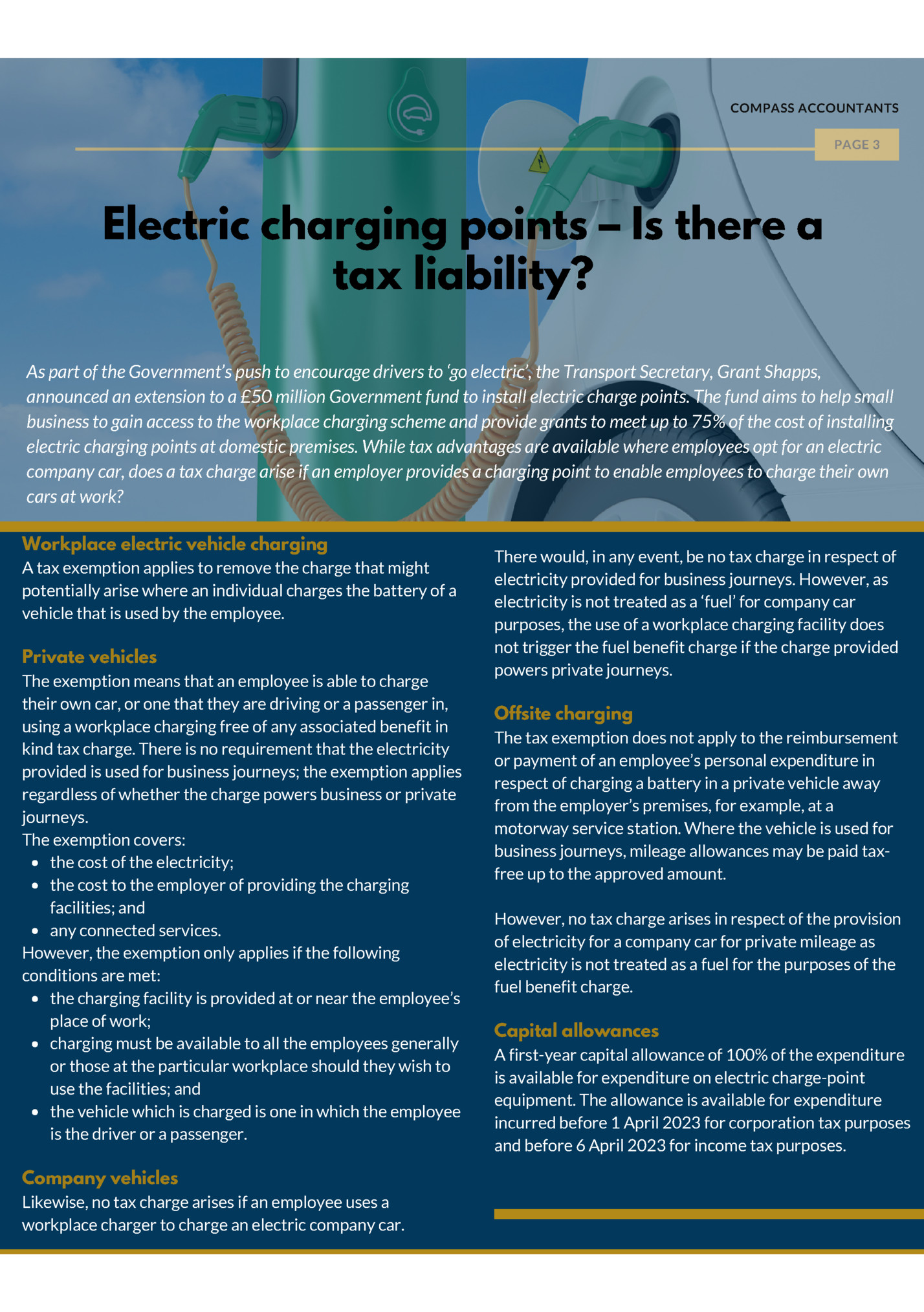
PAGE 4 New reduced rate of VAT for hospitality and leisure The hospitality and leisure industry were particularly hard hit by the effects of the Covid-19 pandemic and associated lockdowns. To help the industry recover they benefitted from a reduced rate of VAT of 5% from 15 July 2020 until 30 September 2021. As a temporary measure, a new reduced rate of VAT of 12.5% applies from 1 October 2021 until 31 March 2022. The rate will revert to the standard rate of 20% from 1 April 2022. Supplies benefitting from the reduced rate The following supplies, which benefitted from the reduced rate of 5% until 30 September 2021, will also benefit from the new reduced rate of 12.5% from 1 October 2021 to 31 March 2022. 1. Food and non-alcoholic beverages sold for on-premises consumption, for example, in restaurants, cafes and pubs. 2. Hot takeaway food and hot takeaway non-alcoholic beverages. 3. Sleeping accommodation in hotels or similar establishments, holiday accommodation, pitch fees for caravans and tents, and associated facilities. 4. Admission to cultural attractions that do not already benefit from the cultural VAT exemption, such as theatres, circuses, fairs, amusement parks, concerts, museums, zoos, cinemas, exhibitions and other similar cultural events and facilities. Where an admission to an attraction is within the existing cultural VAT exemption, this takes precedence over the reduced rate.
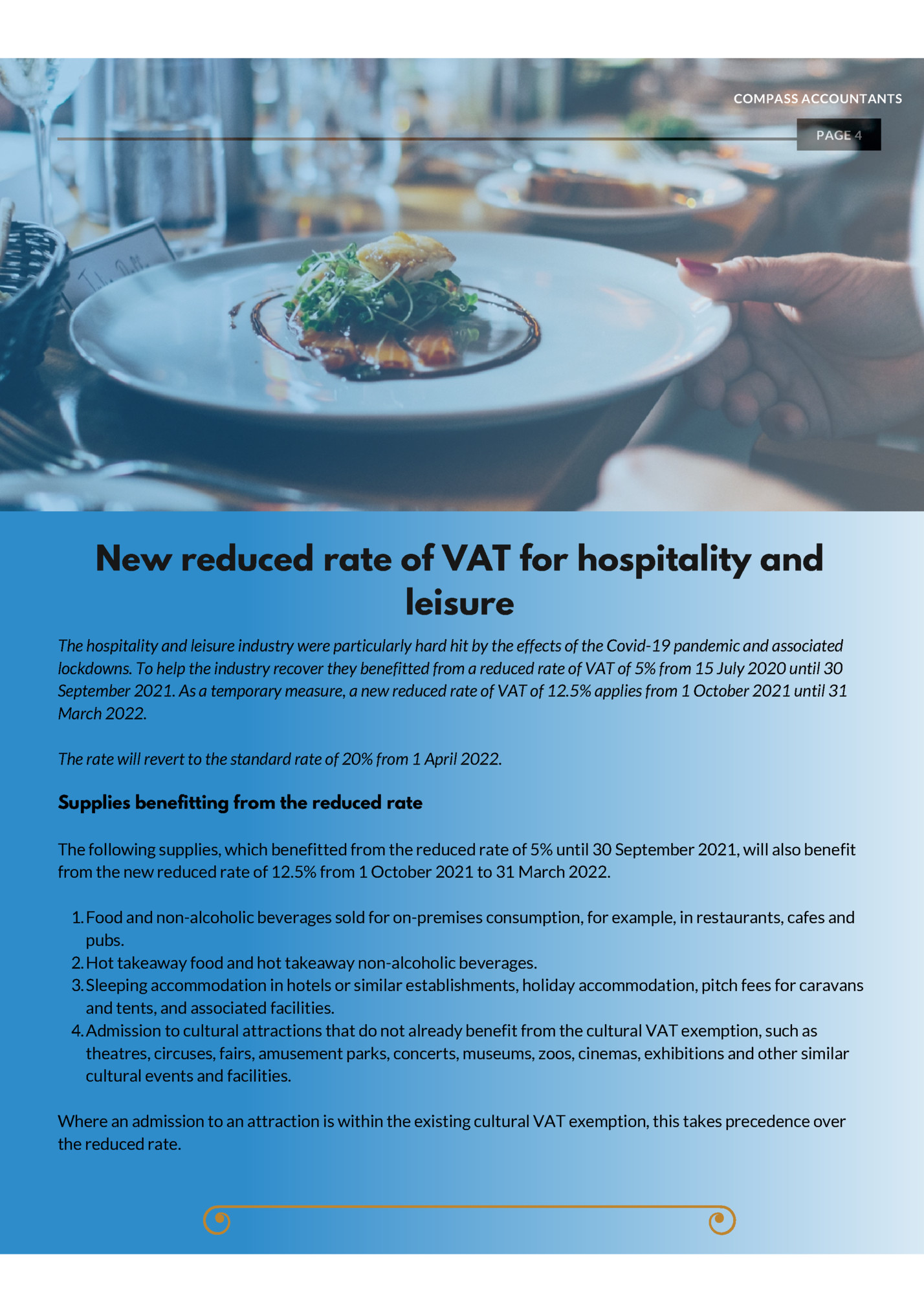
PAGE 5 Increasing the normal minimum pension age The normal minimum pension age (NMPA) is the age at which most pension savers can access their pensions without incurring an unauthorised pension charge (unless they take their pension earlier due to ill-health). A registered pension scheme cannot normally pay any benefits to members until they reach the NMPA (except in the case of ill-health). Registered pension schemes are also not permitted to have a normal retirement age lower than 55. This applies equally to occupations from which people normally retire before the age of 55, for example, professional sports people. It should be noted that the NMPA is a minimum age – while this sets the minimum age at which pension benefits can be taken, the scheme rules will determine the age they can be taken from (which may be higher than the NMPA), and also the benefits that can be taken. The NMPA The NMPA was last increased, from 50 to 55, from 6 April 2010. Plans to increase the NMPA were announced in 2014 following a consultation. A further consultation, which ran from 11 February 2021 to 22 April 2021, confirmed the Government’s intention to increase the NMPA to 57 with effect from April 2028. Protected pension age The new NMPA will not apply to firefighters, the police or to members of the armed forces. Some other pension schemes will have a protected pension age (PPA), which will allow members to continue to take protection benefits before the age of 57. Members of an HMRC-registered pension scheme whose scheme rules on 11 February 2021 conferred an unqualified right for them to receive pension benefits earlier than age 57 will be eligible for a PPA. Where a member has a PPA, this will also apply to benefits that accrue after 5 April 2028. Draft legislation Legislation has been published in draft for inclusion in the Finance Bill to provide for the increase in the NMPA to 57 from 6 April 2028, and also to provide for a PPA where the associated conditions are met. An explanatory note has also been published. Individuals affected The change will affect those born on or after 6 April 1973, who will reach age 55 on or after 6 April 2028. They will now need to wait until age 57 to access pension benefits without suffering an unauthorised payments charge (unless they have a PPA). This will need to be taken into account in retirement planning.
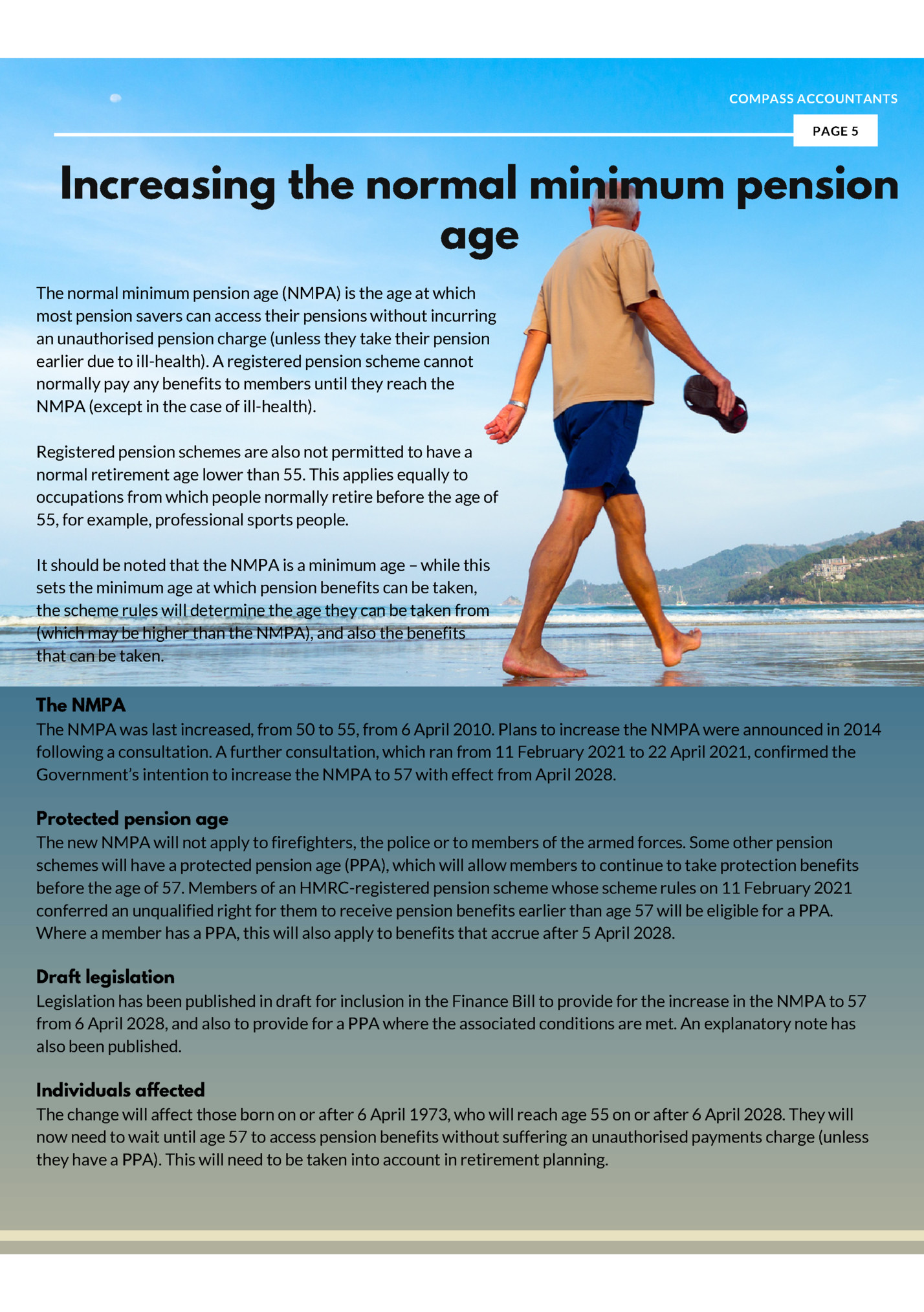
PAGE 4 PAGE 6 Reporting Covid-19 Support Payments on your tax return If you are self-employed and you received Covid-19 support payments during the pandemic, you may need to report these on your self-assessment tax return. If you are an employee and you were furloughed and received furlough grants under the Coronavirus Job Retention Scheme, these were liable to tax under PAYE and liable to National Insurance as for normal salary and wages payments and are included in the figure on your P60. . Grants under the Self-Employment Income Support Scheme If you received a grant from HMRC under the Self-Employment Income Support Scheme (SEISS), you will need to report this in the dedicated Self-Employment Income Support Grant box on the self-assessment return The exact reporting mechanism will depend on whether you complete the full self-employment pages (SA103S) or the short pages (SA103S). If you are a member of a partnership, you will need to report the grants on the relevant partnership pages. SEISS grants are taxable in the tax year in which they are received. This rule applies regardless of the period to which you prepare your accounts. Consequently, grants received between 6 April 2020 and 5 April 2021 (Grants 1, 2 and 3) will need to go on the 2020/21 self-assessment tax return. If you complete the short self-employment pages, your SEISS grants should be entered in box 27.1. If you complete the full self-employment pages, your SEISS grants should be entered in box 70.1. Other taxable support payments If you received other taxable Covid-19 support payments, these too will need to be reported on your 2020/21 self-assessment tax return. This may include Coronavirus Business Support Grants from your local authority or devolved Administration, such as those payable under the Small Business Grant Fund, the Retail, Hospitality and Leisure Grant Fund and the Local Authority Discretionary Grant Fund, or payments under the Eat Out To Help Out Scheme. Test and trace self-isolation payments are also taxable, and need to be reported too. If you complete the short self-employment pages, taxable Covid-19 payments other than SEISS grants, are reported in box 10, while on the full self-employment pages, the relevant box is box 16. Payments that do not need to be reported Money received from loans, such as loans made under the Bounce Back Loan Scheme or other Coronavirus loan schemes does not need to be reported on your tax return. Likewise, you do not need to report any welfare payments received from the council, such as council tax payments or housing benefit.
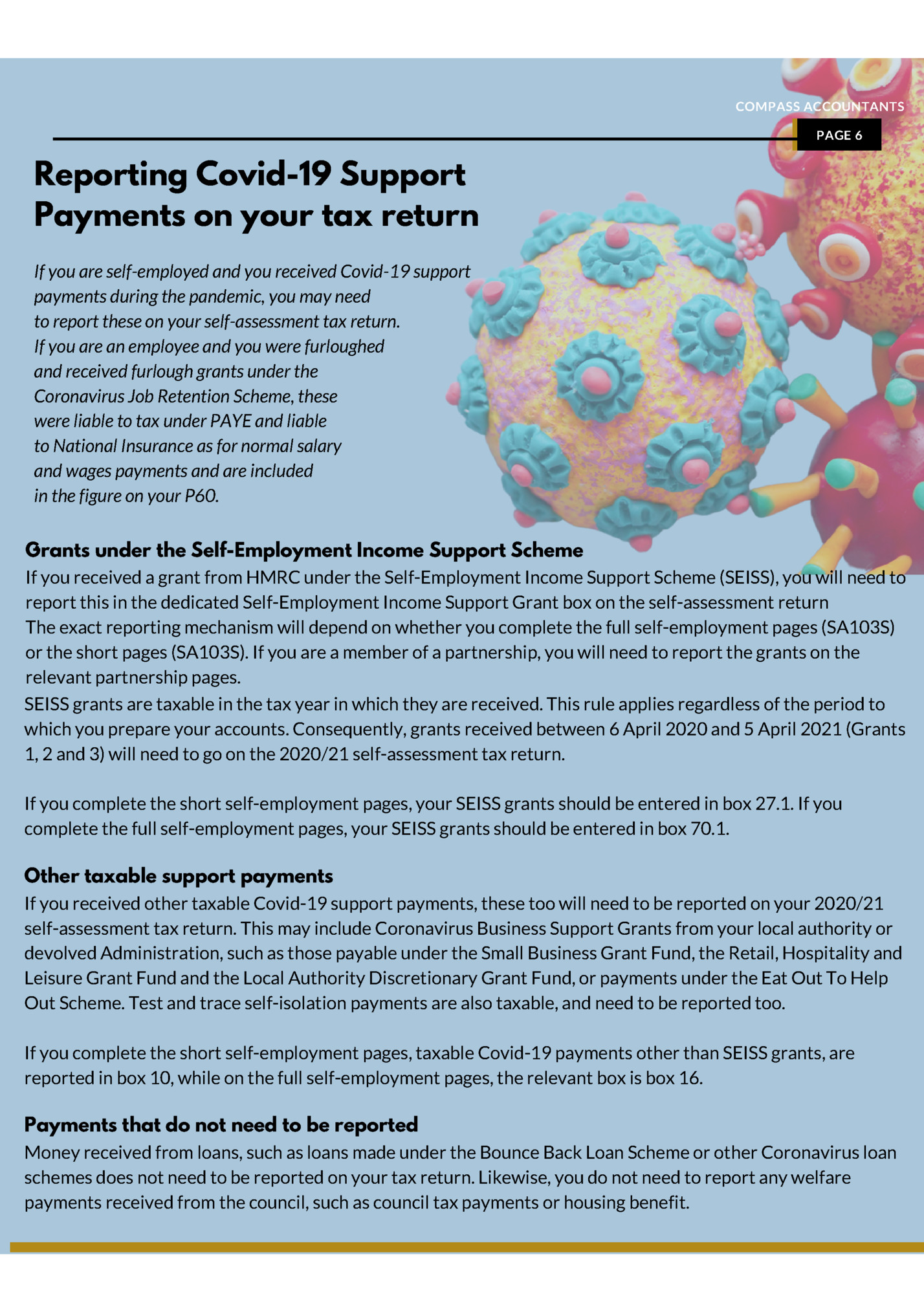
PAGE 4 PAGE 7 Wedding celebrations for Laura and Adam Compass team member, Laura Thomas (previously Puszkar), recently married her husband, Adam Thomas at the Beaulieu Hotel in Lyndhurst . The couple celebrated with 60 guests in the centre of The New Forest. Laura, (who works with Compass as a trainee accountant), had postponed her marriage due to Covid restrictions from September in 2020. "We decided to wait as we wanted have more guests than the restrictions allowed." said Laura. "We are glad we did, as it was great to celebrate with everyone." "We were constantly planning leading up to the wedding, as we needed to make sure we had done everything. Despite the stress of planning and booking we had a wonderful day, and it all worked out perfectly in the end!"
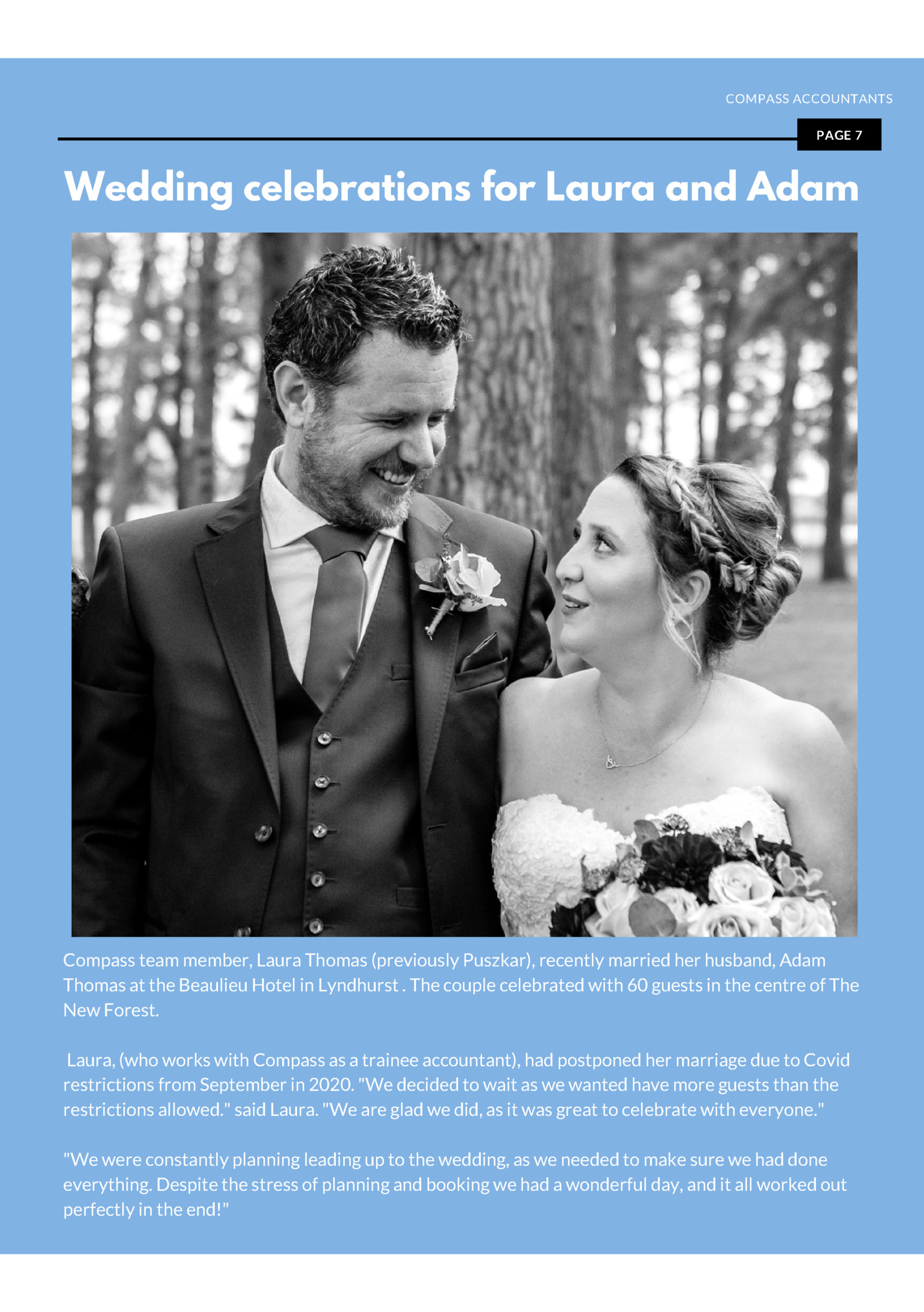
PAGE 7 TAX DIARY NOVEMBER 2021 1 November 2021– Due date for payment of Corporation Tax for period ended 31 January 2021. 2 November 2021– Deadline for submitting P46 (Car) for quarter ending 5 October 2021. 7 November 2021– Deadline for VAT returns and payments of Accounting Quarter period ending 30 September 2021. 19 November 2021– Monthly deadline for postal payments of CIS, NICs and PAYE to HMRC. 22 November 2021– Monthly deadline for electronic remittance of CIS, NICs and PAYE to HMRC. For further information on any of the stories in this month’s newsletter, or for any other matter that Compass Accountants can assist you with, please contact us on 01329 844145 or contact@compassaccountants.co.uk To subscribe to the newsletter, so that each edition is delivered to your inbox, go to www.compassaccountants.co.uk and add your contact details. Compass Accountants, Venture House, The Tanneries, East Street, Titchfield Hampshire. PO14 4AR
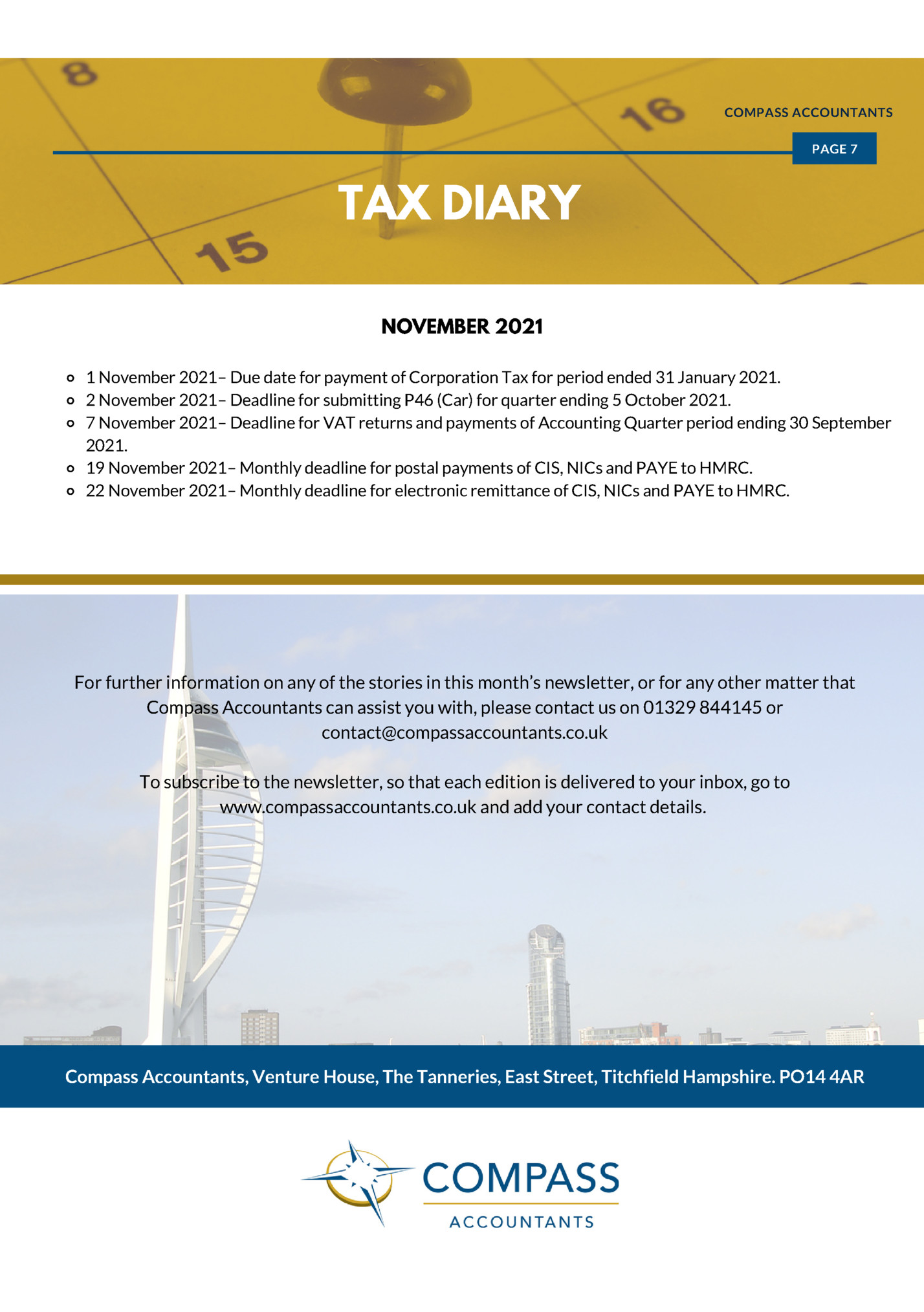
Fleepit Digital © 2021